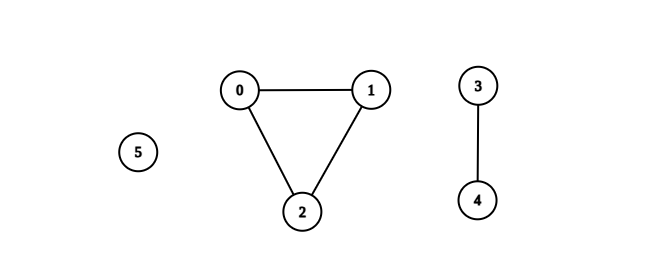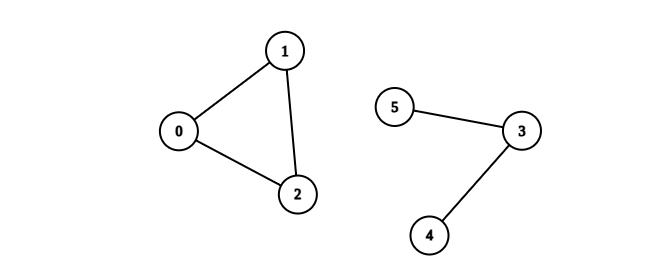2685. 统计完全连通分量的数量
2685. 统计完全连通分量的数量
🟠 🔖 深度优先搜索 广度优先搜索 图 🔗 力扣 LeetCode
题目
You are given an integer n. There is an undirected graph with n vertices, numbered from 0 to n - 1. You are given a 2D integer array edges where edges[i] = [ai, bi] denotes that there exists an undirected edge connecting vertices ai and bi.
Return the number ofcomplete connected components of the graph.
A connected component is a subgraph of a graph in which there exists a path between any two vertices, and no vertex of the subgraph shares an edge with a vertex outside of the subgraph.
A connected component is said to be complete if there exists an edge between every pair of its vertices.
Example 1:

Input: n = 6, edges = [[0,1],[0,2],[1,2],[3,4]]
Output: 3
Explanation: From the picture above, one can see that all of the components of this graph are complete.
Example 2:

Input: n = 6, edges = [[0,1],[0,2],[1,2],[3,4],[3,5]]
Output: 1
Explanation: The component containing vertices 0, 1, and 2 is complete since there is an edge between every pair of two vertices. On the other hand, the component containing vertices 3, 4, and 5 is not complete since there is no edge between vertices 4 and 5. Thus, the number of complete components in this graph is 1.
Constraints:
1 <= n <= 500 <= edges.length <= n * (n - 1) / 2edges[i].length == 20 <= ai, bi <= n - 1ai != bi- There are no repeated edges.
题目大意
给你一个整数 n 。现有一个包含 n 个顶点的 无向 图,顶点按从 0 到 n - 1 编号。给你一个二维整数数组 edges 其中 edges[i] = [ai, bi] 表示顶点 ai 和 bi 之间存在一条 无向 边。
返回图中 完全连通分量 的数量。
如果在子图中任意两个顶点之间都存在路径,并且子图中没有任何一个顶点与子图外部的顶点共享边,则称其为 连通分量 。
如果连通分量中每对节点之间都存在一条边,则称其为 完全连通分量 。
示例 1:

输入: n = 6, edges = [[0,1],[0,2],[1,2],[3,4]]
输出: 3
解释: 如上图所示,可以看到此图所有分量都是完全连通分量。
示例 2:

输入: n = 6, edges = [[0,1],[0,2],[1,2],[3,4],[3,5]]
输出: 1
解释: 包含节点 0、1 和 2 的分量是完全连通分量,因为每对节点之间都存在一条边。
包含节点 3 、4 和 5 的分量不是完全连通分量,因为节点 4 和 5 之间不存在边。
因此,在图中完全连接分量的数量是 1 。
提示:
1 <= n <= 500 <= edges.length <= n * (n - 1) / 2edges[i].length == 20 <= ai, bi <= n - 1ai != bi- 不存在重复的边
解题思路
构建图:
- 使用邻接表
graph表示图结构,graph[a]存储与节点a相邻的节点列表。
- 使用邻接表
DFS 遍历:
- 对每个未访问的节点
i进行 DFS 遍历,找到当前的连通分量component。 - DFS 过程中:
component记录当前连通分量内的所有节点。visited集合记录已访问的节点,避免重复遍历。
- 对每个未访问的节点
检查是否为完全图:
- 对于一个连通分量
component:- 完全图性质:对于每个节点
node,应有graph[node]的邻居数量 ==component.size - 1。 - 如果所有节点都满足上述条件,则该连通分量为完全图。
- 完全图性质:对于每个节点
- 对于一个连通分量
统计满足条件的连通分量数量。
复杂度分析
时间复杂度:
O(n + m)。- 遍历每个节点
O(n)。 - DFS 遍历所有边
O(m)。 - 对每个连通分量进行完全性检查,最差情况
O(n)。
- 遍历每个节点
空间复杂度:
O(n + m)。graph邻接表存储m条边:O(m)。visited和component集合最差情况O(n)。
代码
/**
* @param {number} n
* @param {number[][]} edges
* @return {number}
*/
var countCompleteComponents = function (n, edges) {
let graph = {};
// 构建图
for (let [a, b] of edges) {
if (!graph[a]) {
graph[a] = [];
}
if (!graph[b]) {
graph[b] = [];
}
graph[a].push(b);
graph[b].push(a);
}
let visited = new Set();
let count = 0;
// 遍历每个节点,查找连通分量
for (let i = 0; i < n; i++) {
if (!visited.has(i)) {
let component = new Set();
dfs(i, component, visited);
// 判断该连通分量是否是完全图
if (
[...component].every(
(node) => (graph[node] || []).length === component.size - 1
)
) {
count++;
}
}
}
return count;
// DFS 遍历
function dfs(node, component, visited) {
component.add(node);
visited.add(node);
for (let neighbor of graph[node] || []) {
if (!visited.has(neighbor)) {
dfs(neighbor, component, visited);
}
}
}
};
相关题目
| 题号 | 标题 | 题解 | 标签 | 难度 | 力扣 |
|---|---|---|---|---|---|
| 323 | 无向图中连通分量的数目 🔒 | 深度优先搜索 广度优先搜索 并查集 1+ | 🟠 | 🀄️ 🔗 |
